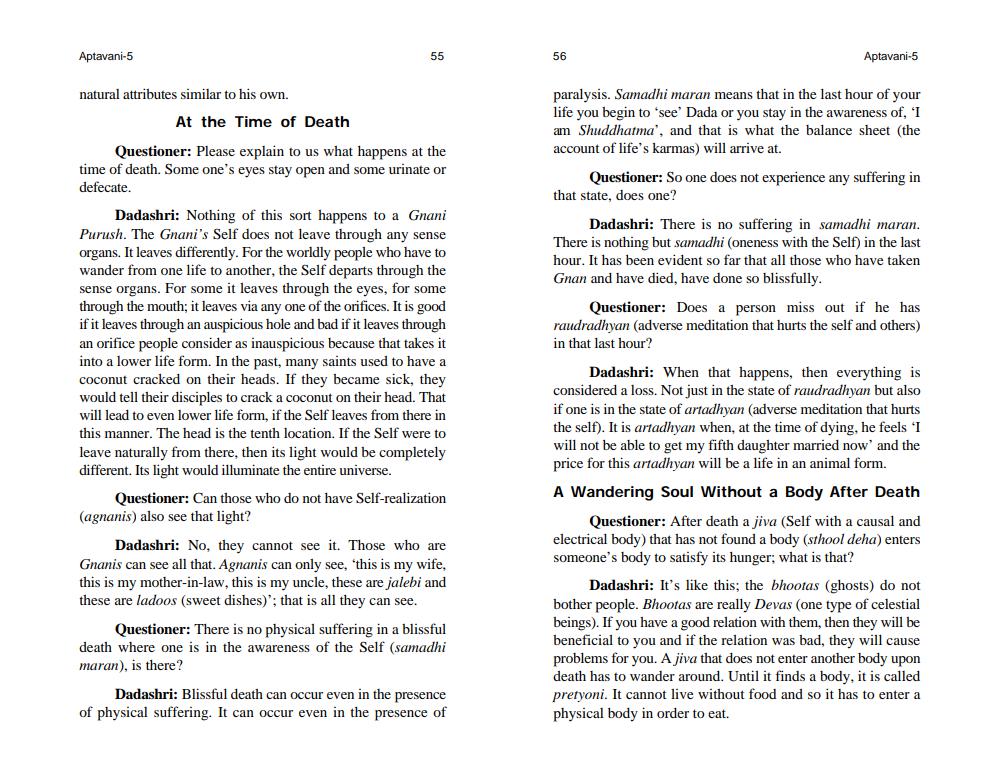________________
Aptavani-5
natural attributes similar to his own.
55
At the Time of Death
Questioner: Please explain to us what happens at the time of death. Some one's eyes stay open and some urinate or defecate.
Dadashri: Nothing of this sort happens to a Gnani Purush. The Gnani's Self does not leave through any sense organs. It leaves differently. For the worldly people who have to wander from one life to another, the Self departs through the sense organs. For some it leaves through the eyes, for some through the mouth; it leaves via any one of the orifices. It is good if it leaves through an auspicious hole and bad if it leaves through an orifice people consider as inauspicious because that takes it into a lower life form. In the past, many saints used to have a coconut cracked on their heads. If they became sick, they would tell their disciples to crack a coconut on their head. That will lead to even lower life form, if the Self leaves from there in this manner. The head is the tenth location. If the Self were to leave naturally from there, then its light would be completely different. Its light would illuminate the entire universe.
Questioner: Can those who do not have Self-realization (agnanis) also see that light?
Dadashri: No, they cannot see it. Those who are Gnanis can see all that. Agnanis can only see, 'this is my wife, this is my mother-in-law, this is my uncle, these are jalebi and these are ladoos (sweet dishes)'; that is all they can see.
Questioner: There is no physical suffering in a blissful death where one is in the awareness of the Self (samadhi maran), is there?
Dadashri: Blissful death can occur even in the presence of physical suffering. It can occur even in the presence of
56
Aptavani-5
paralysis. Samadhi maran means that in the last hour of your life you begin to 'see' Dada or you stay in the awareness of, 'I am Shuddhatma', and that is what the balance sheet (the account of life's karmas) will arrive at.
Questioner: So one does not experience any suffering in that state, does one?
Dadashri: There is no suffering in samadhi maran. There is nothing but samadhi (oneness with the Self) in the last hour. It has been evident so far that all those who have taken Gnan and have died, have done so blissfully.
Questioner: Does a person miss out if he has raudradhyan (adverse meditation that hurts the self and others) in that last hour?
Dadashri: When that happens, then everything is considered a loss. Not just in the state of raudradhyan but also if one is in the state of artadhyan (adverse meditation that hurts the self). It is artadhyan when, at the time of dying, he feels 'I will not be able to get my fifth daughter married now' and the price for this artadhyan will be a life in an animal form.
A Wandering Soul Without a Body After Death
Questioner: After death a jiva (Self with a causal and electrical body) that has not found a body (sthool deha) enters someone's body to satisfy its hunger; what is that?
Dadashri: It's like this; the bhootas (ghosts) do not bother people. Bhootas are really Devas (one type of celestial beings). If you have a good relation with them, then they will be beneficial to you and if the relation was bad, they will cause problems for you. A jiva that does not enter another body upon death has to wander around. Until it finds a body, it is called pretyoni. It cannot live without food and so it has to enter a physical body in order to eat.




